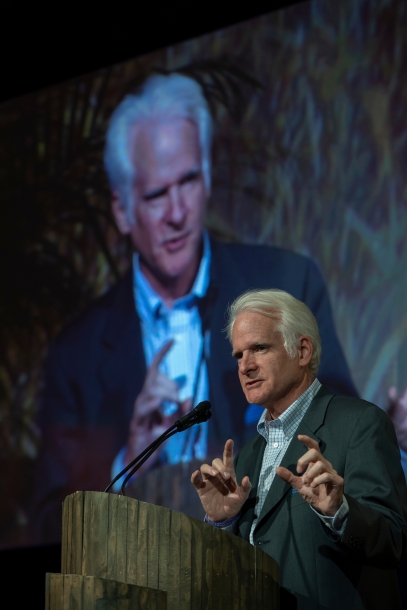You are here
Citizens, Leaders and Time
As part of the global marketing of Hope in a Changing Climate, the award-winning film Halperin executive produced with a team from the Environmental Education Media Project, Halperin authored a series of blog posts from December 2009 to June 2010. The following dispatch is part of this series.
To learn more about the film and ecosystem restoration, see the Hope in a Changing Climate project.
A letter festooned with stamps from Taiwan arrived at our offices last week, with a contribution from a group of mothers who had just screened “Hope in a Changing Climate” at a local school. The full story of this outpouring of support is told by Nicholas Chen, a new EEMP board member.
But it reminds me all of the power not just of the film, but of people working together to change our world. Beyond Copenhagen, beyond the ten transmissions on BBCWorld, and even beyond the more than 15,000 people who have viewed “Hope” on the internet, people in communities across the globe have been brought together around this film. Using our Discussion Guide, invitation templates, and a set of carefully crafted supporting materials more than 64 organizations in 28 nations have engaged diverse stakeholders in film screenings and facilitated discussions. The building blocks for our Campaign for Climate Stability, Ecosystem Restoration and Poverty Eradication thus include organizations as diverse as Mikhail Gorbachev’s International Foundation for Survival and Development of Humanity in Moscow, the National Association of Somali Science and Environmental Journalists, the Secretariat of the Pacific Community in the Fiji Islands and the GIS department of Idaho State University. From Israel to India, people have joined the effort to understand and devise solutions to the intertwined thicket of problems that swirl together like a dust storm: destroyed ecosystems, endemic poverty, and destructive agricultural practices.
Citizens acting alone won’t be able to implement large-scale ecosystem restoration projects that, along with safeguarding peatlands and forests, UNEP believe hold the potential to lower carbon emissions by 50 gigatonnes in coming decades. But political leaders acting alone also seem unable to implement viable solutions to address climate change. But when leaders listen and lead, when citizens insist on accountability and action, then change remarkable change can happen.
And as John D. Liu reported just now in a call from Nairobi, he has been met with remarkable support and enthusiasm this past week from a wide cross-section of Kenyan social, business, and political leaders. There is a deep yearning for the kinds of solutions EEMP champions, for solutions that get at the root causes of problems that have festered too long.
John’s latest thought-provoking piece (Thoughts on Designing Refugee Camps) on improving the lot of the millions of people around the world who find themselves trying to carve out lives in the midst of refugee camps also gets at this question of how important time is in our conception of what solutions work well to address which problems. I am reminded that as Russia was lurching from one crisis to another after the break-up of the Soviet Union, it was common to hear Russians note cautiously that “there is nothing so permanent as temporary measures.” While short term, emergency support is of course needed to combat famine, the devastation of natural disasters that have so overwhelmed Haiti, and other short-term crises that erupt, climate change will never be addressed without attention paid to root causes.
As we work move forward every day with our work at EEMP -- to harness the power of citizens such as the mothers in Taiwan, to take our message to policy leaders as John is doing in Kenya this week and Rwanda next week – we continue to be sensitive to the immediate needs of people in dire circumstances. And we stay clear too that our mission calls for attention to a longer time horizon where we aim to demonstrate the viability of solutions that work not only for the current generation but for many generations to come.
-- Jonathan J. Halperin

